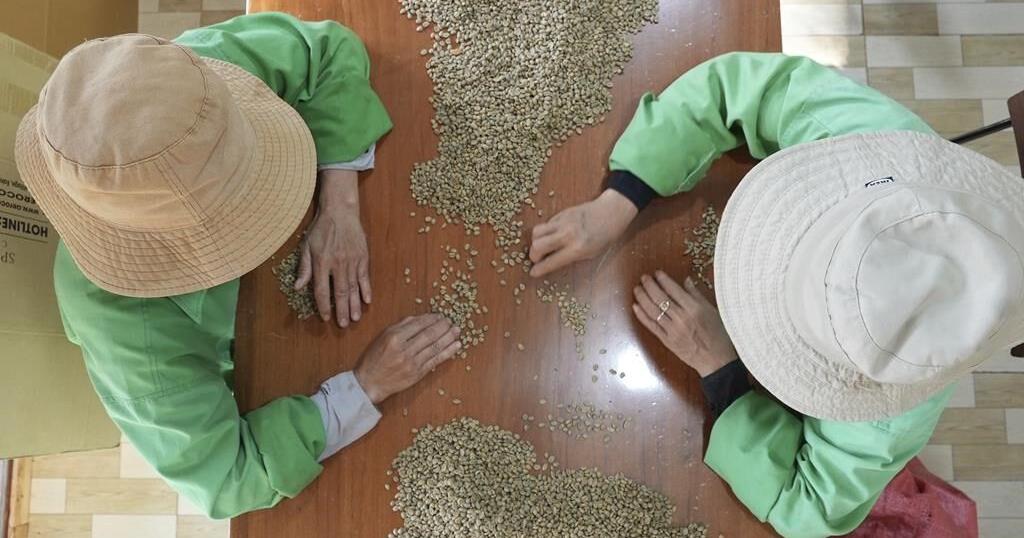Climate change is driving and intensifying extreme weather in the world’s major coffee-producing countries, jeopardizing future crops and putting pressure on global prices.
“Coffee is the canary in the coal mine for climate change and its effect on agriculture,” said Elizabeth Shapiro-Garza, associate professor of the practice of environmental policy and management at Duke University.
“If you like your cup of coffee in the morning, climate change is absolutely going to be affecting the quality, the availability and the price of that cup of coffee.”
Brazil and Vietnam, the two biggest producers of coffee in the world, are both currently grappling with drought.
The drought in Brazil is the worst the country has seen in more than 70 years. It has also been dealing with wildfires.
Coffee is a finicky plant that’s particularly vulnerable to heat and shifts in seasonality, said Shapiro-Garza, adding that the drying process forcoffee can also be adversely affected by extreme weather.
The potential for supply shortages in both countries due to the weather is driving global coffee prices higher, according to a recent report by the Center for Advanced Studies on Applied Economics at the University of Sao Paulo.
“We are seeing fairly dramatic changes in what otherwise we would call traditional normal weather patterns, and these have dramatic effects on the expected supply of coffee come next harvest season,” said Sven Anders, a professor and agricultural economist at the University of Alberta.
Recent heat waves, drought and wildfires in countries including Brazil and Vietnam have been intensified by climate change, research shows.
Amid allthe factors affecting supply, demand for coffee continues to grow, said Anders, which puts extra pressure on the industry.
Canadian coffee drinkers today might not realize that the price of their morning cup is at risk. Over the past year, the average retail price for roasted or ground coffee hasn’t risen much, according to data from Statistics Canada — about 1.6 per cent.
However, over four years, the increase is much steeper: 23.2 per cent between July 2020 and July 2024.
Futures for coffee — a way of measuring commodity prices based on contracts for future delivery — have been rising, said Anders, indicating potential price hikes to come as the industry predicts lower supply on the horizon. The fact that both Brazil and Vietnam are grappling with major weather events at the same time is likely to make the pressure more severe, he said.
“I think this is one of the first times that we’re seeing climate change really impacting coffee prices in a major way,” said Adam Pesce, president of Oakville, Ont.-headquartered Reunion Coffee Roasters.
“It is a perfect storm sort of scenario when you have the two biggest coffee-growing countries in the world having the same sort of challenge in the same year. It’s never really happened before, and that’s why you’re seeing not just the pop in prices, but the pop being sustained,” he said.
“I would say there’s good indication that it’s going to be sustained for a prolonged period. But also, we’ve probably not hit the peak.”
Eventually those higher prices will end up passed down to consumers, he added.
Efforts to mitigate climate change’s effect on coffee include breeding different, more hardy trees, said Shapiro-Garza. For example, she said work is underway to make coffee that’s more resistant to roya, or “coffee rust,” a fungus that’s become a much bigger problem as it spreads more easily in hotter weather.
Other ways to make coffee farms more resilient include diversifying crops and planting shade trees as protection, said Anders.
But it’s not only the crop that’s increasingly vulnerable — it’s also the farmers themselves, many of whom run small, family-based operations.
“Many farmers are actually getting out of coffee because it’s too volatile for them,” said Anders.
Shapiro-Garza said more needs to be done to support coffee farmers so they can adapt to the changing climate and be less vulnerable to shocks in the system. This would not only help address price and supply volatility, but also lower the risk of farmers abandoning their livelihoods in search of something more stable, she said.
Between climate change’s effects on coffee-growing land and the increasing volatility it brings to the industry, “there could be less coffee in the world going forward if something doesn’t change,” said Pesce.
Anders said consumers should expect a near-term price shock in coffee, especially from smaller companies less able to swallow rising costs — but over the longer term he expects prices across the board to rise.
“This is not going to go away.”
— With files from The Associated Press
This report by The Canadian Press was first published Sept. 25, 2024.
